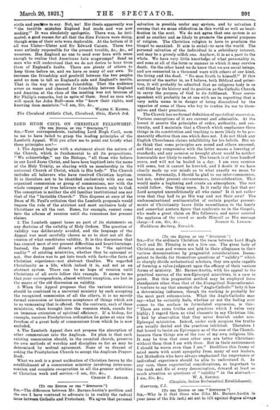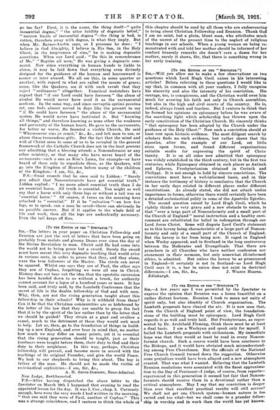(To THE EDITOR OP THE SPECTATOR."] Snt,—Why is it that
those who (like Mr. Barnes-Austin in your issue of the 5th inst.) set out to tilt against dogma always'
go too far? First, it is the name, the thing itself—" quite inessential dogma," " the utter futility of dogmatic belief," " narrow limits of inessential dogma "—the thing is bad, is rotten, therefore away with dogma, is what they imply. But when Mr. Barnes-Austin says, as I presume he does : " I believe in God Almighty, I believe in His Son, in the Holy Ghost, in the forgiveness of sins," he is making dogmatic assertions. When our Lord said : " Do this in remembrance of Me," " Baptize all men," He was giving a dogmatic com- mand. Now since everything in human hands is liable to abuse, it may be laid down that everything even divinely designed for the guidance of the human soul heavenward is sooner or later abused. We all see this, in some quarter or another, with regard to what are called the means of grace; some, like the Quakers, see it with such revolt that they reject " ordinances" altogether. Fanatical teetotalers have argued that "if our Lord could have foreseen " the abuse of alcohol He would never have used it as the sacramental medium. In the same way, and since corruptio optimi pessima est, one feels almost moved in days like the present to say " if He could have foreseen " the abuse of the sacramental system He would never have instituted it. But " knowing all things," and therefore knowing as none other the weakness and perversity of the human heart, He gave us the sacraments, for better or worse, He founded a visible Church, He said " Whosesoever sins ye remit," &c., &c., and left man to use, or abuse these tremendous gifts. But the fact that the mind and will of Christ seem to some of us to be revealed in the general framework of the Catholic Church does not in the least prevent our admitting that a blessing attends a Nonconformist or any other ministry, or that many who have never heard of the sacraments—such a one as Kim's Lama, for example—or have heard of them only to repudiate them, as the Quakers, will go into the Kingdom of Heaven before many of the children of the Kingdom.—I am, Sir, &c., P.S.—Stead records that he once said to Liddon : " Surely you admit that Nonconformists have got essential truth." Liddon replied : " I no more admit essential truth than I do en essential horse. All truth is essential. You might as well say that a horse with only three legs or without a tail was an ' essential horse.' " Of course, it turns on the meaning here attached to " essential." If it be " salvation "—on how few legs, so to speak, can a man be saved—there can obviously be no possible answer. But if it applies to the whole field of life and work, then all the legs are undoubtedly necessary. Even the tail keeps off flies.



































 Previous page
Previous page